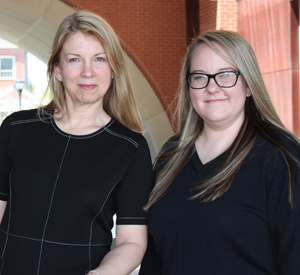
Dr. Shaunda Wood wants to bring coding to elementary school-aged children — especially students who do not often have this opportunity.
The School of Education professor was recently awarded a National Science and Research Council’s [NSERC] PromoScience Grant, valued at $54,630 over three years for her coding program research, “Wasisək kisihtohtit (Children Made It). Coding, learning, and constructing digital STEM literacies: Families and communities becoming creators."
This is the first national grant of its kind at STU.
Additionally the coding program received a STU research grant as well as Association of Professional Engineers and Geoscientists of NB funding, and a New Brunswick Innovation Foundation-Research Assistantships Initiative grant for the first two years during the pilot-testing phase.
“Over the last two years, our program arose in an organic fashion, meeting the needs of underrepresented elementary-aged students, as well as providing extracurricular professional development for new teachers,” Wood says. “Through consultation and community partnerships with First Nations communities, public and higher education, and the Fredericton Public library, a network of STEM literacy supporters have pooled their resources to provide an on-going extracurricular, multifaceted program, at no cost to the elementary-aged participants.”
Through engaging, hands-on activities and workshops that closely reflect provincial math outcomes and international standards, the project aims to provide opportunities to inspire children – to develop an interest in coding and science, technology, engineering, and mathematics (STEM) in their public schooling and beyond.
“An integral part of this program is the hiring of a part-time research assistant and intermediary who is a local community member, Wəlastəkwiyik/Maliseet/French language specialist, and adult immersion teacher—Joleen Paul,” Wood adds. “This role is essential to community support and involvement. Additionally, the program involves BEd students and STU BEd graduates who are highly qualified, multi-lingual workshop leaders.”
Although many start-ups and non-profit organizations are offering coding and STEM programs, no province has integrated coding into its elementary-level curricula, forcing students to find these skills elsewhere. Wood adds that many students lack effective access to these programs — especially many non-traditional populations and students living in rural areas.
Wood’s program teaches coding and STEM literacies to students from New Brunswick schools. These workshops are made available to students in grades 3-5 and their families who have limited access to early technology resources and support around technology.
“The program attempts to create an inclusive science approach, one that invites and values the cultural and educational experiences of Indigenous and non-Indigenous students and families who choose to participate in the workshops. Designing and improving these workshops for students who do not have this opportunity is the main goal,” she says.
“A student who learns to code in elementary school will have a whole new language and design/ICT pathway opened to them,” she says. “Waiting until secondary school to teach computer coding is like teaching the alphabet and reading to a fourteen-year-old hoping for a novel but getting a sentence. Providing the language of coding early allows students to be creative and innovate during their secondary and post-secondary years.”
She adds that coding is one important aspect of 21st Century learning. As such, it should be complementary to, and integrated with, other important STEM learning outcomes to promote understanding and application. In this way, students will ultimately be fluent in the language of design allowing for new types of digital literacies to emerge.
“The goal of developing a scientifically literate citizenry is increasingly important for successful participation in the technology-based global economy that is emerging,” Wood says.
“With the need to address such challenges as global water management, infectious disease control, agricultural engineering, and non-fossil fuel-based energy production, it will be critical that the next generation of workers in industry and the professions be prepared to tackle these problems with logical thinking and problem-solving skills in innovative and creative ways.”
/filters:format(webp)/prod01/stuca/media/stu/site-content/news/BEd.jpg)
/filters:format(webp)/prod01/stuca/media/stu/site-assets/images/features/Bank-of-Canada-Governors-Challenge.jpg)
/filters:format(webp)/prod01/stuca/media/stu/site-content/news/Internship-news.jpg)